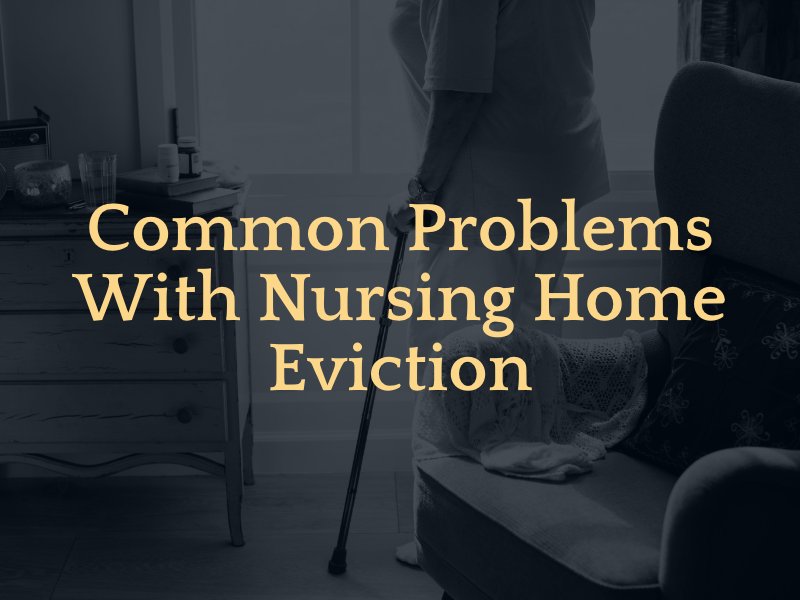
No recovery no fee
Vulnerable elderly nursing home residents rely on the full-time care of nursing home staff and the relative safety of nursing home settings when their needs exceed the care capabilities of family members at home, or when they have no close living family members.
Unfortunately, sometimes nursing homes wrongfully evict residents for reasons including reasons not allowable by law. Improper nursing home evictions and inadequate planning for a resident’s discharge cause substantial problems for nursing home residents and their families.

According to ombudsman reporting, nursing home evictions are among the top five complaints received from family members regarding an elderly loved one’s care in nursing homes. There are two types of nursing home discharges, voluntary and involuntary. If the elderly resident agrees to the discharge because they are going home after improvements in their medical condition, or because they’re moving to another nursing home, hospital, or hospice care center it’s a voluntary discharge.
An involuntary discharge occurs when the resident isn’t ready to leave, doesn’t wish to leave, and/or has no other place to go. Involuntary discharges from nursing homes are also called nursing home evictions. The most common reasons for involuntary evictions include the following:
When Medicare benefits run out, the patient or their family member receives a Notice of Medicare Non-Coverage(NOMNC). This isn’t an eviction notice, but a notice of the impending end of nursing home benefits. After receiving this notice, many residents or their family members apply for Medicaid to provide coverage for the resident to remain in the facility. A nursing home cannot legally evict a resident while their application for Medicaid is pending.
Medicaid is a federal medical benefits program for those with low income. Medicaid does not run out as long as the covered individual continues to meet the low-income requirement. However, because Medicaid pays nursing homes less for the same care, nursing homes prefer Medicare residents and sometimes evict Medicaid patients in favor of filling the bed with a Medicare resident.
The Nursing Home Reform Act passed in 1987 prevents nursing homes from illegally evicting residents. Under the act’s guidelines, nursing homes may only evict residents under six conditions:
In any of these legal reasons for eviction, the nursing home must provide the resident and their family with reasonable notice of the impending eviction. The notice must be in writing and contain specific information including the reason for the discharge or eviction, the destination for the resident after their eviction, a notice of the right to appeal the decision, appeal instructions, contact information for the local ombudsman program, a summary of the resident’s physical and cognitive health, and a discharge care plan.
All too often, nursing homes attempt to evict residents illegally or in a way that violates their rights. Common illegal nursing home evictions occur due to the following circumstances:
When a resident’s Medicare coverage has expired, some nursing homes wrongfully attempt to evict the resident when the law says they must continue to provide a residence and care to the resident while their Medicaid coverage is pending or during the appeal process after a Medicaid coverage denial.
Nursing home administrators must give notice and allow reasonable time for the resident or their family members to make other arrangements, or to apply for Medicaid coverage.
Some facilities use this legal reason for eviction or transfer wrongfully in order to bypass the legal requirement of waiting for a resident’s Medicaid coverage to come through. To use this reason for eviction legally, the law requires the nursing home to state the medical needs of the resident that they cannot meet, how they tried to meet the patient’s needs, the reasons for being unable to meet those care needs, and how the facility where they plan to transfer the patient is better able to meet their needs.
Some nursing homes stop accepting Medicaid patients because Medicaid pays such a small amount per resident; however, while the facility may legally stop accepting new Medicaid residents, they may not evict Medicaid patients already in their care.
Some nursing homes refuse to readmit a resident after hospitalization by claiming they no longer have space available. Legally, nursing homes only have to hold a bed for one to two weeks during the resident’s hospitalization depending on the individual state, but they must readmit the resident as soon as a bed becomes available.
If you or an elderly family member are facing a nursing home eviction, a nursing home abuse lawyer or elder-law lawyer can protect your rights. There are legal strategies to compel nursing homes to follow the laws against wrongfully evicting nursing home residents.
The personal injury attorneys in Phoenix, Arizona, at Knapp & Roberts have the compassion and trial lawyer skills to tell your story to a jury. We will get to know you and your family so that we can help the jury understand what has happened to you and your family and how it has changed your lives. Obtain the compensation necessary for the injuries and losses you have suffered.